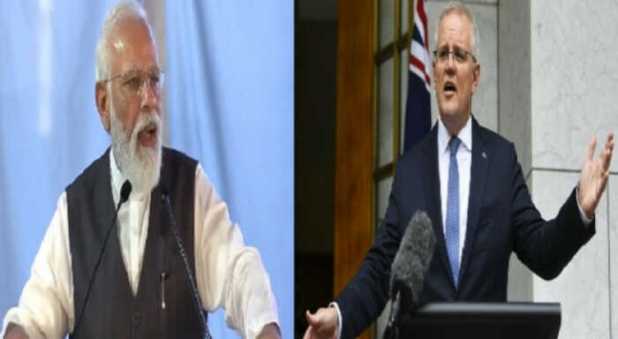
New Delhi, March 20 : After his summit meeting with Japanese PM Fumio Kishida, Prime Minister Narendra Modi is set to have a summit meeting with another Quad partner, Australian Prime Minister Scott Morrison on Monday, that is likely to see the two sides announce an interim free trade deal. The signing of the early harvest deal would pave the way for negotiations on the full India-Australia Comprehensive Economic Cooperation Agreement. Australian Trade Minister Dan Tehan is quoted as saying that the early harvest deal has been finalized after multiple rounds of negotiations between the two countries. Former Australian prime minister Tony Abbott was last year appointed special envoy to take forward the negotiations that had been stalled. “I’m hoping that we will be able to do it over the next few days,” Dan Tehan told ABC Radio National last week. “These are tough discussions and obviously in the end we’ve got to make sure it is in our national interest and … in India’s national interest. “My hope would be we would have something by the end of this week or early next week.” The deal is considered critical for Australia, following the recent export bans from China, with which its relations have taken a downward spiral. The bilateral trade in goods and services between India and Australia increased from US$10.12 billion in 2007 to US$18.08 billion in 2020. Two-way foreign direct investment was valued at US$1.04 billion in 2020. After the interim trade deal, both sides are keen to push for the full India-Australia Comprehensive Economic Cooperation Agreement (CECA) covering most trade in goods and areas such as services, investments, government procurement, and intellectual property. In 2020, India was Australia’s seventh-largest trading partner and sixth largest export destination, driven by coal and international education. Both sides agreed on formal resumption of negotiations on the CECA during the 17th India-Australia Joint Ministerial Commission held on September 30 last year. An interim FTA between India and Australia will lower import duties and expand market access for a limited number of items and sectors. Australian producers are keen on encouraging market access for products not made in India or commodities where India experiences a shortfall in supply, such as pulses, grains, and oilseeds. India is likewise keen to secure market access for its textiles, leather, and gems and jewelry. In January, India had said that sensitive dairy and agriculture items, such as milk, butter, milk powder, or wheat, would be kept out of the trade deal. The focus would be on items not produced in the country, such as blue cheese and Australian tree nuts like macadamias. In their meetings held in February this year, Commerce Minister Piyush Goyal and Australian Trade Minister Dan Tehan’s teams identified key items to be prioritized for greater market access. Among these, the education sector was identified as offering mutually beneficial prospects for both countries. Among the reported proposals is the possibility of allowing Indian students to extend visas by an additional three-five years. On Friday, Australian Prime Minister Morrison said that he and Prime Minister Narendra Modi will be discussing enhancing bilateral trade and investment as well as cooperation in defence and security, besides other areas during the virtual summit on Monday. The two leaders would also be discussing the situation in Ukraine. In a statement, the Australian PM said that he would be hosting PM Modi for the Virtual Annual Leaders’ Meeting on March 21, the second such meeting since the two sides announced the bilateral Comprehensive Strategic Partnership in 2020. “Australia and India’s strong bilateral relationship is based on mutual understanding and trust, a commitment to democracy, and a shared vision of an open, inclusive, resilient and prosperous Indo-Pacific. “Prime Minister Modi and I will discuss deepening our trade and investment relationship and harnessing new economic opport ties to support our mutual economic recovery and growth. “Central to these endeavours are strengthened cooperation in defence and security, science and technology, and critical minerals and clean energy. “We will also discuss a range of regional and multilateral issues, including the situation in Ukraine and its implications for the Indo-Pacific, and Myanmar. “I look forward to reaffirming our Comprehensive Strategic Partnership and advancing our shared bilateral and regional agenda.” RN
